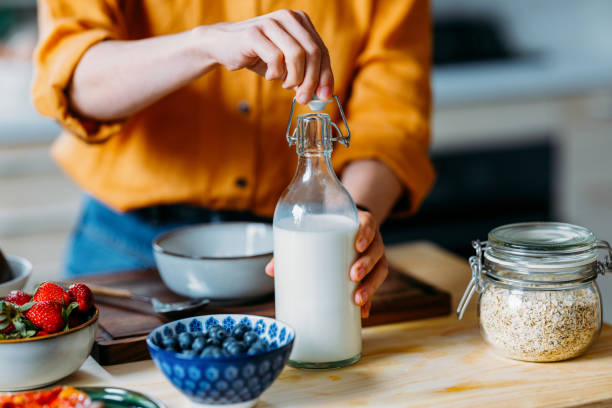Maintaining healthy bones is essential for overall well-being. As we grow older, our bones gradually lose their strength and density. While the body continues to renew bone tissue throughout life, this natural process becomes slower with age—particularly after the age of 30. Experts point out that bone density reaches its peak around that age, after which bone loss occurs faster than bone formation. Over time, this can lead to weak, brittle bones that are more likely to fracture, increasing the risk of osteoporosis.
Although bone loss is more common in older adults, unhealthy dietary habits and a sedentary lifestyle can also accelerate the decline in bone health among younger individuals. Fortunately, adopting a few simple dietary habits—especially increasing your milk intake—can help you maintain stronger bones for years to come.
The Importance of Calcium for Bone Health
Calcium plays a vital role in maintaining strong bones and teeth. The World Health Organization (WHO) recommends that adults consume between 1,000 and 1,300 mg of calcium per day. Unfortunately, many people fall short of meeting this requirement through their daily meals.
Milk is one of the best and most natural sources of calcium. For those who are not lactose intolerant, drinking milk regularly can make a significant difference in bone health. Two glasses of milk a day—whether whole, low-fat, or skim—can provide about 600 mg of calcium. The rest can be fulfilled through other calcium-rich foods.
If you are lactose intolerant, speak to a dietitian about alternative calcium sources such as leafy greens, fortified plant-based milks, nuts, and seeds.
Simple Ways to Include More Milk in Your Diet
If you dislike the taste of plain milk, there are several creative ways to add it to your daily routine:
- Make Healthy Porridges: Prepare oatmeal, wheat flakes, or rice puff porridge using milk instead of water. Enhance the flavor by adding a pinch of cardamom powder, cinnamon, or a few raisins.
- Add Natural Flavors: Instead of protein powders or artificial sweeteners, try flavoring your milk with turmeric, cardamom (elaichi), rose syrup, or a bit of cocoa powder. If you are diabetic, avoid sugary additives.
- Add Dairy to Soups: Blend a little homemade fresh cream into soups like cream of tomato, mushroom, or broccoli. This not only enhances the taste but also increases your calcium intake.
- Prepare Milk-Based Desserts: Enjoy light desserts such as kheer, custard, or pudding. Use minimal sugar for a healthier option.
- Blend Milkshakes with Fruits: Combine milk with seasonal fruits to make delicious milkshakes. This way, you get both calcium and antioxidants in one go.
- Eat Other Dairy Foods: Incorporate other dairy products such as yogurt, paneer (cottage cheese), and cheese into your meals for additional calcium.
Taking Care of Your Bones Naturally
Good bone health isn’t only about drinking milk—it’s about maintaining an overall balanced diet, getting enough vitamin D, and staying physically active. Regular exercise such as walking, yoga, or light strength training can help maintain bone density and prevent early bone loss.
Conclusion
Always consult with your doctor or a healthcare professional before making any major changes to your diet, lifestyle, or medical routine. They can offer personalized advice based on your current health condition and medical history.
Note: If you have any health-related concerns, please call us at +91-9058577992 to receive free consultation from our experienced doctors. Thank you.
